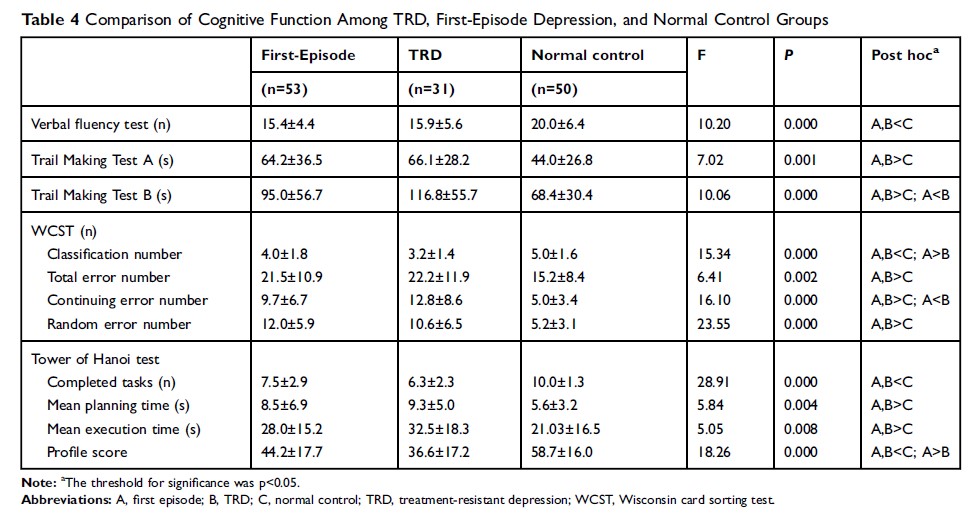108384
论文已发表
注册即可获取德孚的最新动态
IF 收录期刊
- 3.4 Breast Cancer (Dove Med Press)
- 3.2 Clin Epidemiol
- 2.6 Cancer Manag Res
- 2.9 Infect Drug Resist
- 3.7 Clin Interv Aging
- 5.1 Drug Des Dev Ther
- 3.1 Int J Chronic Obstr
- 6.6 Int J Nanomed
- 2.6 Int J Women's Health
- 2.9 Neuropsych Dis Treat
- 2.8 OncoTargets Ther
- 2.0 Patient Prefer Adher
- 2.2 Ther Clin Risk Manag
- 2.5 J Pain Res
- 3.0 Diabet Metab Synd Ob
- 3.2 Psychol Res Behav Ma
- 3.4 Nat Sci Sleep
- 1.8 Pharmgenomics Pers Med
- 2.0 Risk Manag Healthc Policy
- 4.1 J Inflamm Res
- 2.0 Int J Gen Med
- 3.4 J Hepatocell Carcinoma
- 3.0 J Asthma Allergy
- 2.2 Clin Cosmet Investig Dermatol
- 2.4 J Multidiscip Healthc

难治性抑郁症患者与初发抑郁症患者认知功能的比较研究
Authors Rao D, Xu G, Lu Z, Liang H, Lin K, Tang M
Received 7 August 2019
Accepted for publication 13 November 2019
Published 9 December 2019 Volume 2019:15 Pages 3411—3417
DOI https://doi.org/10.2147/NDT.S226405
Checked for plagiarism Yes
Review by Single-blind
Peer reviewer comments 2
Editor who approved publication: Professor Jun Chen
Objective: Despite reports of cognitive dysfunction during the acute phase of depression, there is a lack of studies in patients with treatment-resistant depression (TRD). The aim of this study was to investigate the cognitive function profile of TRD and compare cognitive dysfunction between subjects with TRD and first-episode depression.
Patients and methods: The study included 31 patients with TRD and 53 with first-episode depression. Cognitive function was assessed by a series of neuropsychological tools such as the verbal fluency test, Modified Wisconsin Card Sorting Test (M-WCST), Tower of Hanoi test, Chinese-revision of the Wechsler Adult Intelligence Scale (WAIS-RC), and Trail Making Test A and B.
Results: There were no significant demographic differences between the TRD, first-episode depression, and normal control groups (gender, age, years of education). The full-scale, verbal, and performance intelligence quotients measured with the WAIS-RC were also not significantly different (p>0.05). The normal group scores were all significantly better than TRD and first-episode depression, and the TRD group performed significantly worse than subjects with first-episode depression on Trail Making Test B, two WCST subscales, and the profile score of the Tower of Hanoi test (all p<0.05).
Conclusion: Patients with depression exhibited global impairments in cognitive function, and these were more common in TRD. Poor executive function may play an important role in TRD.
Keywords: treatment-resistant depression, first-episode depression, cognitive dysfunction
